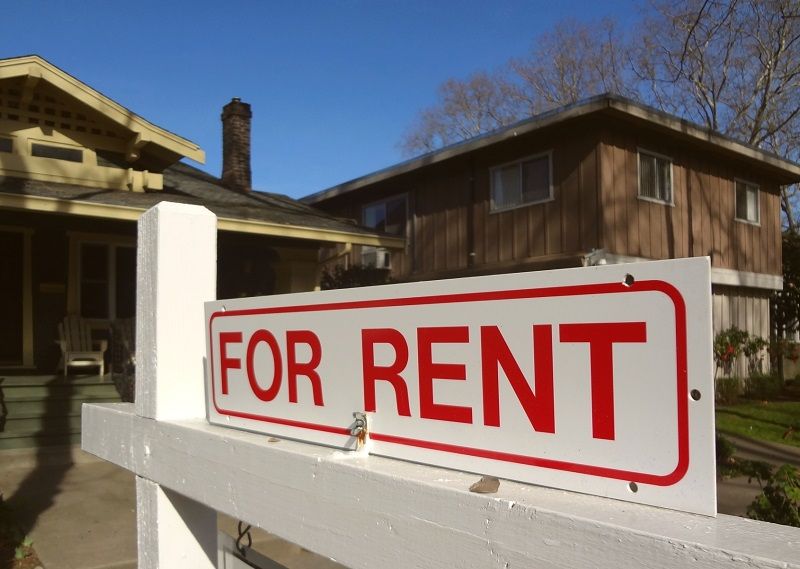By Eric Fruits, Ph.D.
Oregon will soon be the first state to have a statewide rent control program. Last week, in my first week at Cascade Policy Institute, I testified in opposition to the rent control bill, SB 608. The bill has the support of the Governor Kate Brown, House Speaker Tina Kotek, and Senate President Peter Courtney. About 100 people signed up to testify, and supporters outnumbered opponents by 2-to-1. It’s a done deal and it’s a bad deal.
During World War II, the federal government instituted a national system of rent controls, establishing maximum rents for rental properties. New York City was the only city to retain this first generation of rent controls after the war. During the 1970s, rent regulations were introduced in many cities, including Boston; Washington, D.C.; San Francisco; and Los Angeles.
In contrast with pure rent control (a fixed maximum price), SB 608 is a form of “second generation” rent controls that allows annual rent increases, limited to 7 percent plus inflation. Rent controls under SB 608 apply to buildings that are more than 15 years old. The bill also places strict limits on “no cause evictions.”
Nobel laureate Paul Krugman wrote in the New York Times that rent control is “among the best-understood issues in all of economics, and—among economists, anyway—one of the least controversial.”[1] Krugman’s well known and widely used economics textbook describes the economic inefficiencies associated with rent control:[2]
Rent control, like all price ceilings, creates inefficiency in at least four distinct ways. It reduces the quantity of apartments rented below the efficient level; it typically leads to misallocation of apartments among would-be renters; it leads to wasted time and effort as people search for apartments; and it leads landlords to maintain apartments in inefficiently low quality or condition.
Proponents of rent controls argue that “second generation” rent controls reduce or eliminate the inefficiencies associated with “first generation” rent controls. For example, Kotek was quoted in the Oregonian:[3]
What you’re hearing from landlords about rent control is they have an idea of it that’s very much the model that began right after World War II where properties had hard, fast caps on rents. That’s not the kind of rent control we’re talking about. We’re talking about second generation rent stabilization where there’s a process for managing rent increases that protects investors and tenants.
Kotek is correct that second generation rent controls are not as bad as first generation rent controls, but it’s matter of degree. Second-degree burns aren’t as bad as third-degree burns, but a second-degree burn still hurts.
While many proponents see rent control as one way to address housing affordability, none of them indicated it would do anything to resolve what is widely perceived to be a housing shortage. In fact, an expert flown in from Berkeley by the housing committee admitted that rent controls in other cities have led to the conversion of apartments to condominium. He went so far as to suggest legislation that would ban the conversion of apartments to condos.
This suggestion lays bare the pernicious chain of regulation that rent control brings. Second generation rent control doesn’t “work” unless there are strict limits on the termination of month-to-month rents. Then, it won’t work unless there are strict limits on the conversion of units. One witness even suggested that apartment building owners should be forbidden from selling their properties.
The limits on providers’ ability to terminate leases will lead to providers becoming more selective in to whom they rent units. In this way, the ordinance misallocates rental units among would-be renters and may do the most harm to those whom the bill is intended to help, such as those with a history of homelessness, impaired credit, criminal convictions, or employment instability. An older woman testified about her horror story of trying to find an apartment with her retired husband in Medford, applying to dozens of apartments only to be told she’d be on a list. Her story will become more common as rent controls reduce the supply of rental units.
In addition to the inefficiencies identified by Krugman, SB 608 will ultimately lead to higher rents than would occur in the absence of the law. As rental units turn over, providers will factor in the expected cost of the law into the rents and other fees that they charge incoming residents. Some or all of the expected cost associated with SB 608 will be passed on to tenants. Ultimately, the law will have the perverse impact of increasing—rather than reducing or stabilizing—rents over time and reducing the amount of market rate housing available to low- and middle-income households.
[1] Krugman, Paul. “A rent affair.” New York Times. June 7, 2000.
[2] Krugman, Paul and Robin Wells. Microeconomics, 3rd ed. New York: Worth Publishers. 2013. p. 130.
[3] Friedman, Gordon R. “Portland’s Tina Kotek explains her rent control plans—and landlord pains.” Oregonian. February 4, 2017.
Eric Fruits, Ph.D. is Vice President of Research at Cascade Policy Institute, Oregon’s free market public policy research organization.
Click here for PDF version:













JimK
When I lived near NYC in the 1980’s the wait time for a rent control apartment was 14 years. This policy will mean each year the minimum increase will be the maximum allowable increase. Value of rental properties will go down because they will be unable to sell.
fmckinyon@gmail.com
I own a number of apartment buildings in PDX. My long term strategy has always been ” a bit nicer for a more responsible tenant.” The new restrictions injure this plan or affect others.
. If I am uncertain about an improvement and consequent rent increases, I do not hire a contractor, a plumber, electrician, painter, tile man, floor refinisher. I do not purchase new lighting fixtures, appliances and blinds, sheet rock and 2×4’s. I do not upgrade the landscape, nor mow the lawn as often. A substantial % of these suppliers are moderate to middle income workers.
. When you impose restrictions on who I can rent to, beyond the amount of rent, you take away by ability to manage my complex in whatever unique way.I deem appropriate. I am referring specifically to the background checks.
. Based on reports I receive from the State, a substantial influx of educated people move to Portland. You are distorting and restricting my ability to respond to the desires of many of this level of income earners.
. If PDX has a need for lower income housing, then reduce the cost to a competitive builder to respond to that need. Whether the UGB or building fees. Attach the problem directly. The homeless population, which seems to have grown immensely in recent years, is an entirely different issue that is not addressed with rent control.
. Finally, city management needs to address the downtown miliue, particularly the street issue and homeless issue. There are stores and restaurants in downtown PDX that we will not visit, due to the concern of safely. Many of the employees of those enterprises are again the moderate income earning crowd and are harmed by the lack of control by the city government.
Bob Clark
Krugman is a rather progressive economist, too boot. I think he supports minimum wage laws.
I wonder also if the 7% plus inflation doesn’t actually become the target for land lords to increase rents annually, in sort of a guide which allows landlords to informally to fix in a rather lax ways their rents.
I read where in New York City rent control/stabilization is causing big land lords to take over the rental apartment business. Bigger land lords have more wherewithal to sue tenants for one reason or another for evicting, then the tenant is not with the means to file a defense in court. So, Big land lords are working around the rent regulations.
Then, too, this is probably just a first step. My advice is not to invest too much in Oregon, other than maybe your one home. And make your wealth un-trackable so the regressive authorities now in charge of most of the Willamette Valley and at the state government level can’t confiscate it. You might also want to prepare for the same regime taking over the federal government.
It’s not hyperbole the Unionized schools have groomed many of the upcoming generations to be socialist green, and this is why we are getting regressive forces threatening the levers of government force. That and a total lack of knowledge of the history of socialistic failure.
Glenn
Government regulations and development restrictions have created the problem of high housing costs, so now it wants to “fix” the problem. If government at any level starts dictating directly to the market, is there anything about the market that it won’t eventually try to control? More than just shades of other socialist/communist countries.
Should property owners now raise rents 7%+ annually to cover any future restrictions on the market, some of which may be retroactive? Such increases will soon reduce the units available to the average consumer. If we think the homeless issue is bad now, just wait a minute. When rates double from what they are now, owners will be able to meet their fixed expenses with only half the units rented.
Ken Donaldson
We will be forced to increase rents annually because of this, and all new tenants will get a six month lease so I can terminate if they prove to be bad tenants. The next issue is the volume of laws Fed, State and City that make it difficult to not be breaking a law unknowingly. The plethora of laws has us considering a property management company.
Julie Klopf
I disagree with your point:
Rent control, like all price ceilings, creates inefficiency in at least four distinct ways. It reduces the quantity of apartments rented below the efficient level; it typically leads to misallocation of apartments among would-be renters; it leads to wasted time and effort as people search for apartments; and it leads landlords to maintain apartments in inefficiently low quality or condition.
I live in a bungalow at SW Market and SW 18th. I have lived here for 8 years and the rent has increased from $750 to 1450 for a 1 bedroom, The increase in rent has not transpose into higher quality conditions. There have been long standing issues such as water leaks and low quality insulation on this property which have not been addressed in full by the property owner despite years of rent increases by Norris and Stevens. Certainly cosmetic issues…but negative on truly structural issues. Because there is high renter turnover no one keeps track of these issues…but I do.
Rent control does not lead to wasted time and effort as people search for apartments. I am an extremely busy professional. I am in this neighborhood because it is close to the clinics and hospital I work at as an RN. I have been skeptical that I will be able to stay here and keep up with my student loans the way the market is going. With SB 608 passing I can plan accordingly and not waste my time and effort searching for a new apartment.
I have written a similar letter to Senator Shemia Fagan with whom you debated this weekend. There are multiple approaches to the problem of homelessness and people getting priced out of their neighborhoods where they live and work. SB 608 is one of them.